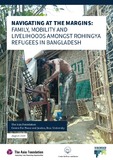| dc.description.abstract | Decades of persecution of the Rohingya community in
Myanmar have culminated in several large waves of forced
displacement, and a total of nearly one million now live as
refugees in the camps of Cox’s Bazar across the Bangladesh
border. Many others have sought refuge in Malaysia and
other countries across the region. Widespread irregular
migration has reshaped Rohingya society, with a vast
number of families splintered across multiple borders.
Although international justice mechanisms are engaged, a
durable political remedy for the crisis is not yet visible on
the horizon. Since 2017, the humanitarian response has
focused on short-term needs such as food, shelter, and basic
healthcare. As the displacement crisis enters its fourth
year, a shift in approach is due. This study, Navigating at the
Margins, carried out by The Asia Foundation and the Centre
for Peace and Justice, Brac University, utilizes qualitative
and quantitative methods to document how Rohingya
families in the camps of Cox’s Bazar cope with hardship,
with a focus on family separation and economic challenges.
Most separated family members possess no travel
documents and have little prospect of reuniting. For some
of those living in the camps, having relatives abroad can
be a helpful way to cope with the challenges of refugee
life. Remittances help fill the gap between the sustenance
they receive as aid and the higher actual cost of living.
But these are only available to a minority of households.
Furthermore, displacement and separation tend to erode
family ties that are critical to enabling repatriation in the
future. Already, camp residents are more likely to have a
relative living in a third country than in Myanmar, and a
new generation of Rohingya are growing up in Bangladesh
who do not speak the Myanmar language.
The refugees’ sense of reprieve after fleeing immediate
danger has given way to the realization that they will
likely stay in the camps a long time. Therefore, their
priorities have expanded to include longer-term necessities
such as education for their children. Camp households
are also pressed to find ways to come up with money
for the assorted living costs not covered by aid, such
as communication expenses, a more diverse diet, or
healthcare for conditions not treated by camp facilities.
However, access to Cash for Work programs or NGO jobs
remains limited, and just under half of camp households
report having no income at all to supplement aid. As a
result, some families sell a portion of their rations or
engage in riskier activities to make ends meet. The majority
of refugee households also accrue unsustainable amounts
of debt. Facing a bleak future in an environment offering no
hope of upward social mobility, some opt to place their lives
into the hands of traffickers and risk perilous travel to other
countries. Medium-term livelihood solutions are needed to
prevent harmful coping patterns and allow refugees, most
of whom lost all their assets in the exodus, to rebuild their
lives until they eventually leave the camps. | en_US |

